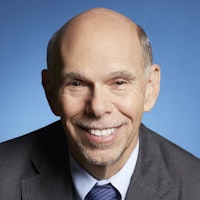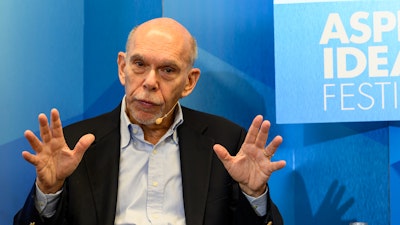Deep Dive: Drug Prices and Access to Medicine
Setup
The average annual cost of cancer drugs in the US now exceeds $100,000 and the price of more than 200 generic drugs doubled from 2013 to 2014. That puts them far out of reach for countess ailing people, including many with decent insurance. The industry argues that it needs the revenue for the complex and expensive research that leads to better treatments, but pharmaceutical executives are being pilloried in editorials and Congressional hearings, and consumer groups say marketing and profit are the real drivers of price. What’s behind the cost of drugs? What are the options for people who can’t pay it?
Speakers
-
 Kenneth DavisExecutive Vice Chair of the Board of Trustees of the Mount Sinai Healt...
Kenneth DavisExecutive Vice Chair of the Board of Trustees of the Mount Sinai Healt... -
 Alan WeilSenior Vice President, Public Policy, AARP
Alan WeilSenior Vice President, Public Policy, AARP -
 Kiah WilliamsCo-Founder and Director, SIRUM
Kiah WilliamsCo-Founder and Director, SIRUM -
 Lisa GillDeputy Content Editor, Best Buy Drugs, Consumer Reports (Festival Unde...
Lisa GillDeputy Content Editor, Best Buy Drugs, Consumer Reports (Festival Unde... -
 Ezekiel EmanuelVice Provost for Global Initiatives, University of Pennsylvania
Ezekiel EmanuelVice Provost for Global Initiatives, University of Pennsylvania -
 Geoffrey ChaikenCo-Founder and CEO, Blink Health
Geoffrey ChaikenCo-Founder and CEO, Blink Health -
 Kirsten AxelsenVice President Global Policy, Pfizer (Festival Underwriter)
Kirsten AxelsenVice President Global Policy, Pfizer (Festival Underwriter)
Explore More
Health


The rapid development of the Covid-19 vaccine and the ramp-up of manufacturing and global distribution were unprecedented feats of medical coordination. But those on the insid...

Space… the final metaphor for the unknowable. But we are certainly trying to understand what goes on out there, and the more we learn, the more fascinating questions start to...

Since 2014, Aspen Ideas: Health has welcomed nearly 800 inspiring women leaders to our stages to share their bold approaches to better health. In honor of Women's History Mont...

Our attitudes, habits, pleasures, and responsibilities shift across the generations, influencing the health challenges we face and how we respond to them. Expectations about h...

Setting audacious goals helps to redefine what is achievable in health, medicine, and science. As we deepen understanding of the human genome, unravel the mysteries of the bra...

As we wrap-up another year of elevating big ideas at Aspen Ideas: Health, we're excited to share the 15 most-watched sessions from the event. These conversations with inspirin...


Research on aging and extending life and healthspan has ventured beyond humans to our best animal friends – dogs. In less than a year, dog owners may be able to buy a drug tha...

In America, millions of people struggle with mental health including depression, anxiety, and more — all further exacerbated by living through a pandemic. The National Allianc...

The United States spends $4.3 trillion—almost one fifth of the nation’s GDP—on health care. As the scale of the medical enterprise expands, venture capitalists are pursuing th...

Today's kids are coming of age against a backdrop of political, social, technological and economic upheaval. While these circumstances are shaping a precocious generation that...

Advocates, healthcare providers, legislators, researchers, and venture capitalists are bringing the unique health needs of women to light – from vigorous policy debates on iss...

From the debate over reproductive rights to the epidemic of gun violence to the youth mental health crisis, this year's Aspen Ideas: Health sessions tackled many of today's mo...

The recognition that all things are connected is at once a scientific principle and a philosophical touchstone. Humans, animals, and the environment are intertwined in complex...

Our need for human connection is profound and deep. Yet, today, one in two adults are living with measurable levels of loneliness – and the numbers are even higher among young...

For as long as humans have looked at the skies, we’ve speculated about whether there is life in space. Scientists, the U.S. military and the CIA have all searched for proof of...

It sounds like sci-fi: Scientists are beaming solar energy from space, subbing seaweed for plastic and brightening clouds to reflect sunlight to lower temperatures in a warmin...

Artificial intelligence is revolutionizing health care by improving patient navigation, telehealth and the speed of drug development. From enhancing patient and provider exper...

*No food or service animals allowed in this session.* The creator of Fat Bear Week in Alaska gives insight on the importance of wildlife education, and then ecologists unpack...

Brain-computer interfaces show potential to restore function to people impacted by incurable neurological conditions such as stroke, spinal cord injury, traumatic brain injury...

Scientists are developing life-extending drugs for dogs, and new advancements could bring them to market by 2025. Two leaders working to slow the aging process for Fido discus...








